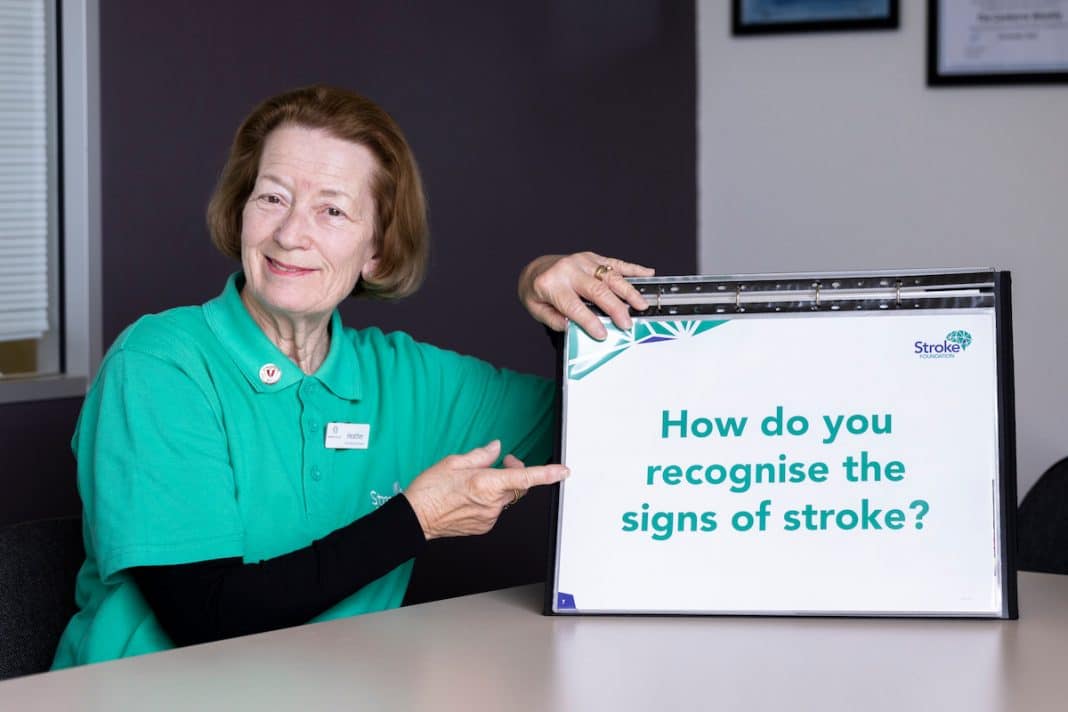With almost 400 first-time strokes to be experienced by ACT residents this year, and less than a third predicted to arrive at hospital in time for life-saving treatment, a retired neuroscience nurse says Canberrans can do more to address stroke risk.
Heather Hart has been a Stroke Foundation volunteer for eight years. In that time, she has educated hundreds of Canberrans and delivered potentially life-saving messages about stroke.
“It’s alarming how many people don’t know the FAST signs of stroke,” she said.
The Chisholm woman has seen firsthand the devastation cause by stroke after 45 years in nursing – 21 in neuroscience – and witnessing the impact of stroke on her best friend, Julie, at age 51.
“I saw the impact not only on her life, but on her family’s life,” said Heather. “It can devastate their livelihood, career, independence, and extended families.
“My best friend was a preschool teacher. I was the nurse in her preschool. To see the effect it had on her life, where her comprehension was still there; she knew what she wanted to say but couldn’t say it.
“Ultimately, she ended up in a care facility because she couldn’t walk unassisted.”
More than 6,200 stroke survivors are currently living in the Canberra community.
“As a nurse, I cared for many stroke survivors. I saw on a daily basis the frustration people feel when they struggle to walk, talk, swallow, process – things you and I take for granted.
“It just makes me think, if 80 per cent of strokes are preventable, why aren’t we doing our best to prevent this?
“It’s much easier to nip it in the bud and stop a stroke before it happens.”
That thought, and Julie’s life, led Heather to dedicating her retirement to stroke prevention and awareness. She now visits workplaces, community groups, aged care homes and conferences and provides StrokeSafe talks.
After almost a decade with the Stroke Foundation, Heather estimates a few thousand Canberrans know how to check for signs of stroke – “but certainly not 462,000”.
“We want everyone in Canberra to know the FAST signs,” she said:

- Face: Check their face. Is it drooped?
- Arms: Can they lift both arms?
- Speech: Is their speech slurred? Do they understand you?
- Time is critical. If you see any of these signs, call triple zero (000) straight away.
Stroke is always a medical emergency.
“The clots that cause strokes can be dissolved IF you get to the hospital within 5-6 hours of the onset,” Heather said.
“Often people wake up with the symptoms, and we don’t know when in the night they started … leading to complacency.”
More than 80 per cent of strokes can be prevented by getting your blood pressure checked regularly and living a healthy, active lifestyle.
Just half an hour of exercise five times a week can reduce stroke risk by 25 per cent, decreasing hypertension, diabetes, cholesterol, depression, and stress.
However, almost a quarter of Canberrans hardly exercise (18.9 per cent) or don’t exercise at all (2.9 per cent).
“Know your stroke risk,” said Heather. “Australians over the age of 45 can get a free stroke assessment at their GP (covered by Medicare).”
StrokeSafe presentations are available in-person and online. If you would like to request a free presentation, please call 1300 194 196 or book online.
Get the latest Canberra news, sport, entertainment, lifestyle, competitions and more delivered straight to your inbox with the Canberra Daily Newsletter. Sign up here.



